A short biography of Zamenhof
Ludwik Lejzer Zamenhof (known in Esperanto as Ludoviko Lazaro) was born on the 15th of December 1859 in Ulica Zielona ('Green Street') in the city of Białystok in 'Congress Poland', part of the Russian Empire, now part of an independent Polish state. His father, Markus Zamenhof, was a schoolteacher who taught German, French and Geography. When Markus spoke to young Ludoviko he spoke in Russian, which was also the language which Ludoviko used in school. Rozalia Zamenhof, housewife and mother of Ludoviko, would speak to her son in Yiddish. Throughout his childhood, Ludoviko showed a love for languages. He dreamed of becoming a Russian writer, and to that end wrote a five-act tragedy, as well as several verses. Later, in adulthood, he wrote in a letter that he spoke three languages fluently (Russian, Polish and German), and that he also read French fluently, but was not a confident French-speaker. Throughout his life he learned more than ten languages.
Unfortunately Zamenhof did not have an easy start to life. However it was through his difficult beginnings that he came up with the idea of Esperanto. In his memoirs, Zamenhof wrote about the unfriendly relations which existed between Białystok’s numerous different cultural groups. Young Zamenhof often witnessed ethnically motivated attacks at the market place. This deeply affected him, and even as a child he believed that the main reason for the hostile relations between nationalities was the lack of a shared, culturally-neutral language. His boyhood dream was of a single language for all humanity. This dream strongly possessed him and it never left him.
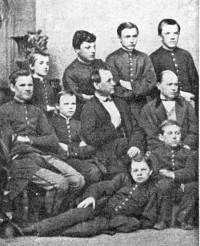
Ludoviko was always a diligent student and his teachers said that he was very capable. He started elementary school in 1865 at five-years old. In 1869, at nine-years old, he entered secondary school, where he began studying foreign languages. In 1873, now a young teenager, the family moved to Warsaw, where Ludovik's father started to teach German in a secondary school.
In Warsaw, Zamenhof witnessed a complete lack of integration between groups. According to his memoirs, each group (e.g. Russians, Poles, Jews etc) was hostile to each other. He became increasingly conscious of his Jewish identity due to the anti-semitic policies of the Russian Tsarist regime.
Having witnessed and experienced anti-semitism in Warsaw throughout his teenage years, in around 1882, in his early twenties, he later joined the Zionist movement for an independent Jewish homeland. It would be wrong to interpret Zamenhof’s interpretation of Zionism as chauvinistic. His priority, from a very young age onwards, was a shared common humanity. He dedicated his entire life to this dream. Conscious of contradictions, he decidedly renounced the Zionist movement in 1887. Nonetheless, he always sympathised with the difficult circumstances of the Jewish people.
The idea of a common language was always on Zamenhof’s mind. He decided quite early on that any international language had to be neutral and couldn’t exclusively belong to any one nationality or culture. Due to the tensions which existed between different nationalities, he understood that no one culture’s language could be accepted by all as an acceptable bridge between peoples.
In 1873, aged 23, Zamenhof attended the Warsaw classical gymnasium educational institution, and became familiar with several ancient languages. The potential relevance of this to his dream was not lost on him, as he considered attempting to revive one of the languages of antiquity for use in his own era. But he ultimately decided that no hitherto existing languages could satisfy the requirements of the common language which he dreamed about. Therefore, he also recognised that a new artificial was required. At that point, he not only dreamed about a common neutral language, but also began to work on its creation.
Lingwe uniwersala
During his studies at the Warsaw classical gymnasium educational institution, specifically in his 5th year, Zamenhof studied English grammar. The simplicity of English grammar in comparison to Greek and Latin amazed him. Inspired by the English language, he became convinced that there was no need for excessive grammatical rules in his language. Unnecessary rules were consigned to the dustbin, in favour of a much more minimalistic set of grammatical rules which could be outlined in only a few pages. Ludoviko considered this a great milestone in his work and it enthused him greatly to continue his linguistic work. However the issue of a massive vocabulary troubled him somewhat.
One day Zamenhof noticed a couple of signs which read швейцарская ("guard room") and кондитерская ("sweet shop") and this sparked a Eureka moment: suffixes were the solution to avoiding the problem of an overly vast vocabulary. Even basic words (e.g. those for mother or knife) could be easily remembered with the help of suffixes.
Zamenhof also noticed that a large quantity of words were already shared between multiple widely used languages. These words, already international and mutually understandable between various languages, were carried over into the language which Zamenhof authored. He used Latin and Germanic roots as the source of his vocabulary, choosing those which were the simplest and most international.
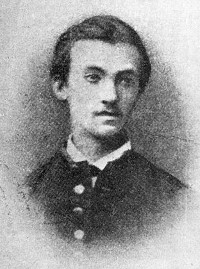
In 1878, before Zamenhof had even reached the age of 20, he had practically finished the preparation of his new international language, and he was ready to name it "Lingwe uniwersala". Ludoviko celebrated the completion of the newly designed language with his school friends in his parents’ houses. During that early stage of the language "Lingwe uniwersala" was still very different from the fully competed Esperanto.
The following year, 1879, Ludoviko traveled to Moscow to begin his university studies. It was clear that Ludoviko had an interest in languages but his father thought that linguistics and literature were hopeless professions and that medicine was a better prospect. He told Ludoviko that linguistics could not support a family. Ludoviko was forced to follow his fathers wishes and started studying medicine. There is a legend that his father burnt the notebook with Lingwe uniwersala when Ludoviko was in Moscow. He only wanted the best for his son; to focus on his studies, to become a good doctor, and to forget about seemingly unattainable dreams of creating an international language.
Lingvo internacia
The financial situation of his father caused Ludoviko to leave Moscow and return to Warsaw in 1881. Due to the fact that Ludoviko had siblings who were also students, the father could no longer afford to keep sending money for Ludoviko’s food and rent. Nonetheless Ludoviko was able to continue his medical studies in Warsaw.
When Ludoviko returned home he found out that his father had deliberately burnt his Lingwe uniwersala notebook. At first he was very unhappy about this, but he could actually still remember all of the details, and he came to realise that the first version of the language was flawed. Some features that seemed suitable in theory were unsuitable in practice. He tested his language out by frequently translating texts. He avoided word-for-word translation, or leaning too heavily upon any one language, and he tried to actually conduct the thinking process primarily in the neutral language. Upon doing this, he noticed that the language had come to life and developed its own spirit. It had its own expressive style which was not dependent on any external influence. He named this variant of the language "Lingvo internacia". In 1884, during the final year of his medical studies, the international language took the form of the current Esperanto.
Upon completion of his medical studies, Ludoviko found work in a medical practice in Lithuania where he lived with his sister and her husband. (Lithuania was also part of the Russian Empire at that time). He began searching for a publisher for the language, but this took him two years. It was around this time that he began to specialise in eye medicine, as he had come to the conclusion that it was one of the calmest and most peaceful specialisms of the medical profession. He soon returned to Warsaw.
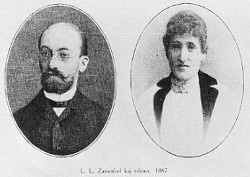
During the winter of 1886-87, Ludoviko met Klara Zilbernik, who had been living with his sister, and they fell in love with each other. Klara's father, a soap manufacturer, gave Ludoviko money to publish the language book. Ludoviko decided to use the pseudonym Doctor Esperanto. In order to make a living, he depended on the public. He thought that if he published the book using his real name that he might be seen as a dreamer preoccupied with unprofessional side issues, and that this could cause his business to take a hit. It is evident from his later writings that Zamenhof worried about these risks a great deal.
1887 was a very special year for Ludoviko. On the 26th of July his first Esperanto book was released. And on the 9th of August he married Klara. Not until death did they part.
The Birth of Esperanto
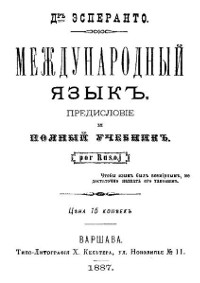
On the 26th of July, the first Esperanto textbook was published. The 26th of July is now celebrated as the birthday of Esperanto. The first edition was in Russian, entiled Международный языкъ. Предисловіе и полный учебникъ ("International Language. Introduction and full textbook"). By the end of 1887, the same textbook was also released in Polish, German and French, and also re-released as a second edition in Russian. An English edition was released in 1888, but unfortunately it was a bad translation, and so Zamenhof stopped its sale. Thanks to the translation of Richard H. Geoghegan, an Irishman who lived in England, a better quality English edition was published in 1889.
Following the book’s release, a highly enthusiastic community of adherents soon sprung up. There had been another slightly earlier project for another artificial international language, Volapük. But it quickly became apparent that Zamenhof’s language was more sophisticated in terms of its logic, accessibility and beauty, and therefore more suitable than Volapük for international communication. He began to receive letters (in various languages, including Esperanto!) with questions, advice and approval. It was a great joy for Zamenhof to see the language he had created be lifted off the written page and brought to life by similarly passionate and like-minded people.
Following on the success of the ‘First Book’ in 1887, the ‘Second Book’ was released in 1888 ("Dua Libro de l’ Lingvo Internacia"). It was the first ever book written entirely in Esperanto. In 1889, on the first of September, "La Esperantisto" was published in Nuremburg (Germany). It was the first Esperanto periodical. The earliest Esperanto groups started to take root in towns throughout Europe, and as time went on, the wider world. An international movement was being created.
Facing financial difficulties, in 1889, Zamenhof temporarily left his family and moved to the town of Kherson (now in the southern part of Ukraine). He unfortunately didn’t find any work there and so after around six months away he had to move back to Warsaw again in 1890. On the upside, this meant that the family was reunited. Klara and their two children Adam and Sophie had been living with her father in Kaunas, modern Lithuania. But the money troubles did not go away.
The popularity of Esperanto continued to grow and Zamenhof entered correspondence with many of the new Esperantists in many countries. Being such a man of letters was both time consuming and a considerable expense. His financial situation continued to get worse, so Ludoviko had to move once more, this time to Grodno (modern Belarus). His family came behind him and they lived together in Grodno for several years, until 1898 when they finally settled in Warsaw.
It would be wrong to consider Zamenhof as some kind of ‘one-trick pony’. Of course he was always active as an Esperantist; reading, writing, communicating. But he also remained active in the sciences. For example, in 1897, he returned to university in Warsaw to conduct further postgraduate studies in the field of ophthalmology.
From 1898 until 1914 when the First World War broke out, he lived in a working-class area in Warsaw’s Jewish Quarter. Compared to other eye care professionals, his prices were inexpensive. He would often waive the fees of clients who were evidently hard up. Due to the value for money which Zamenhof offered, he attracted a large clientele, and worked long hours. Many people in need of eye care could afford to go to Zamenhof’s surgery and nowhere else. When the working day was done, he dedicated his nights to Esperanto. He lived this in this frugal, modest, altruistic way of life until he died.
The First Congress
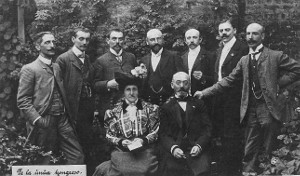
The year 1898 saw a considerable upturn in the activities of the Esperanto movement in numerous countries. This led to the first annual Universal Congress, which was held between 5-12th August 1905, in the French town of Boulogne-sur-Mer. 688 participant from 20 countries attended the congress. This number includes Zamenhof himself, who presented a long speech and generally relished the experience. This congress was one of his most cherished memories; it was very emotional for him. The event proved to him beyond any lingering doubts that Esperanto could be spoken fluently and could be easily understood by people of diverse nationalities. Zamenhof took part in eight more consecutive Universal Congresses; that is, all of them until until the cancellation of the planned 1914 event, due to WW1. Klara always accompanied her husband to these events and, as a genuinely dedicated Esperantist, she continued to attend the Universal Congress after his death.
Although Esperanto continued to grow in popularity, from actually quite early on, enthusiasts announced their proposals to linguistically reform the language. At first, Zamenhof democratically listened to each proposal and meticulously reported them in the Esperanto magazine La Esperantisto. Before long however, Zamenhof concluded that the various proposals were contradictory with each other. Some proposals might satisfy certain parts of the movement, but would have been rejected by others. He reflected on his own experience that although certain aspects of linguistics may theoretically seem to be fine, that this often simply does not translate into practice.
The Foundation of Esperanto
Zamenhof never claimed ownership of the Esperanto language. Although he had authored the artificial linguistic foundations, he believed that the rest of the language would develop organically, as with any other living language. It was in this spirit than the movement accepted the 1905 document "Fundamento de Esperanto", and declared that nobody had the right to adapt that document. With the backing of most Esperantists, Zamenhof rejected the proposals of linguistic reform, and promoted "Fundamento de Esperanto".
However, this did not settle the proposals for linguistic reform, and a schism occurred within the movement. The Ido splinter group (and language!) appeared on the scene. This was quite a painful blow for Zamenhof. In his characteristic humble, peaceful nature, he tried to play down the problem, and he never showed any hostility towards any of his opponents. Although some Esperantists might have considered Louis de Beaufront (the leader of the Ido movement) as a bit of a Judas, Zamenhof demonstrated a willingness to co-operate until the very end, evidenced in particular by a surprisingly charitable letter.
The End of Zamenhof's Life
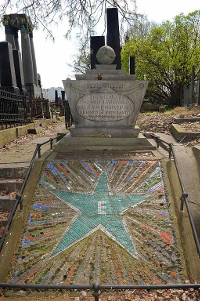
Following the cancellation of the 1914 Universal Congress in Paris, the 1915 event was scheduled to be held in Edinburgh, but was moved to San Francisco due to the war. Attendance was low due to the war and travel restrictions. Like many others, Zamenhof missed what was the final Universal Congress, until 1920 when they once again became an annual fixture.
But of course the cancellation of these Esperanto events paled in significance in comparison with the the wider wartime events. Zamenhof considered humanity ‘one big family’ and was therefore deeply disturbed at the fratricide. His health deteriorated during the war, and he was no longer able to work such long hours. His son Adam took it upon himself to take up much of his father's workload. When the German army occupied Warsaw from 1914, the Zamenhof familiy became divided and Ludoviko didn't even have the option of keeping in touch with his daughter and some of his other relatives who had lived outside Warsaw.
Zamenhof died on the 14th of April 1917. Perhaps we might say that he died of a broken heart caused by the war. For his whole life he worked hard for the Esperanto language and movement. Here are a few words about Zamenhof from the prominent Esperantist Gaston Waringhien’s book "1887 kaj la sekvo…":
Zamenhof did not enjoy being in the public eye. His participation in official ceremonies was somewhat reluctant, aware that he really should attend given his status as the author of Esperanto. He was one of those rare people who played an important role internationally and yet has nothing to fear or hide from his correspondence: in fact his letters show a gentle nature, a profound sincerity, and a high sense of justice.
He was not much of a speaker, in fact he was quiet and soft-spoken. He smoked a lot, especially cigarettes. He had suffered a weak heart and an insufficient pulse in his feet from the beginning of the 20th century. Because of that, he would visit German spas in summer when he could afford to do so.
However, his most important character traits were his willpower (he would commit all of his energy for his ideals) and the patient stubbornness (thanks to which he was able to overcome any obstacles that might lie in the way of achieving his goals). His unwavering love was what allowed him to access both of those traits and inspired him to bring, with all the might and power of his body, mind and soul, a bit of solace to the physically and morally blinded humanity in fulfilling the antique prophecy ‘Comfort you, comfort you my people.’
Sources
- Kolker B. Vojaĝo en Esperanto-lando, Rotterdam, 2005
- Korĵenkov A. Homarano: La vivo, verkoj kaj ideoj de d-ro Zamenhof, Kaliningrado, Kaunas, 2009
- Privat E. Vivo de Zamenhof , Rikmansworth, 1957
- Thien H. La vivo de D.ro L.L. Zamenhof en bildoj
- Семенова, З. В., Исаев М. И. Учебник языка эсперанто, Москва, 1984
- https://eo.wikipedia.org/wiki/Dua_Libro
- https://eo.wikipedia.org/wiki/L._L._Zamenhof
- https://eo.wikipedia.org/wiki/Fundamento_de_Esperanto
